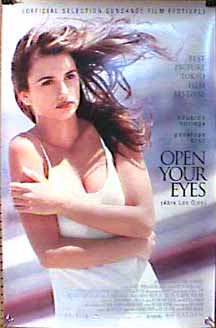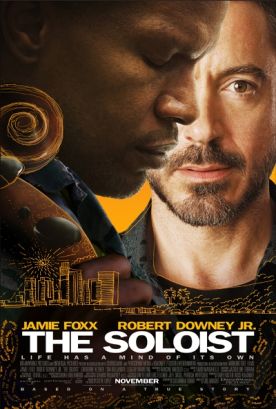Abre Los Ojos (Open Your Eyes)
There is an essential bit of information about the plot of Open Your
Eyes (in Spanish Abre Los Ojos), directed by Alejandro
Amenábar, which is withheld until almost the end of the film and which,
because I think it just about worth seeing, I will not reveal here. But it is
worth knowing that it is coming, lest you begin to think, as I did, that this
was just another weird but boring movie dreamscape, like Matrix, in which
nothing is real, or perhaps a bit of Spanish “magic realism, ” like Lovers of
the Arctic Circle. You might therefore get bored and walk out and so miss
out on learning the secret that makes a kind of sense of the movie’s
action — albeit sense of a futuristic, science fiction kind that still
leaves you rather confused at the end. This is the kind of movie that you are
meant to come out of engrossed in animated discussions among yourselves about
“ what it means ”— a bit like 2001: A Space Odyssey. Also like
2001, it is a little too self-consciously “deep.”
It tells the story of César (Eduardo Noriega), a rich, handsome young
man who, on the night of his 25th birthday, meets the beautiful Sofia
(Penélope Cruz) and thinks he has found his perfect woman. But
César is a bit of a playboy and, as playboys often do, he has neglected
to be off with the old before he is on with the new. At the end of his enchanted
evening with Sofia, he is confronted by Nuria (Najwa Nimri) whom he has just
dumped and who is now stalking him. Knowing that César and Sofia have not
slept together, Nuria offers him sex for old times’ sake, and he agrees to go
with her to her apartment. Once he is in her car, however, she asks him about
his idea of happiness, his belief in God, and then deliberately crashes into a
wall, killing herself and horribly disfiguring him.
From this point on, the film becomes doubly confusing (though we eventually
see why). The story continues as César, wearing a mask, is being quizzed
by a prison psychiatrist (Chete Lera) about a crime he cannot remember having
committed. César tells his own story — presented to us as
flashbacks — to the psychiatrist, but it seems to move on two tracks. On
one, he remains disfigured and Sofia is decidedly cold to him; on the other, the
doctors are miraculously able to restore his good looks and Sofia loves him
again. In both, however, and in his dealings with the shrink, reality seems to
have taken on a nightmarish quality, especially when he finally remembers
killing Sofia. Or was it Nuria? He has a speaking alarm clock that says “Open
your eyes,” and both he and we begin to wonder whether he is going to do just
that and find it all a dream.
That’s not quite what happens, but the question of dream or reality is left
unresolved at the end. The fact that it is not left unresolvable, however, is a
definite plus. As is the fact that, at another level, the metaphysics can be
ignored and the film read as a kind of moral parable. The Don Juan is
punished — as art and literature have always recognized he must be
punished — by a very private and personal hell in which, having treated
women as interchangeable devices for supplying him with sexual pleasure, he
finds himself unable to tell the killer bitch from the woman he has — alas,
too late! — learned to love. At the same time, he is deprived of the good
looks which had enabled him to seduce them, and experiences for the first time
what it is like to be rejected as unattractive. Unfortunately, the moral and
metaphysical themes do not seem on a first viewing to fit very well together,
though I’d be willing to see the film again to see if they did the second
time.
Discover more from James Bowman
Subscribe to get the latest posts to your email.





